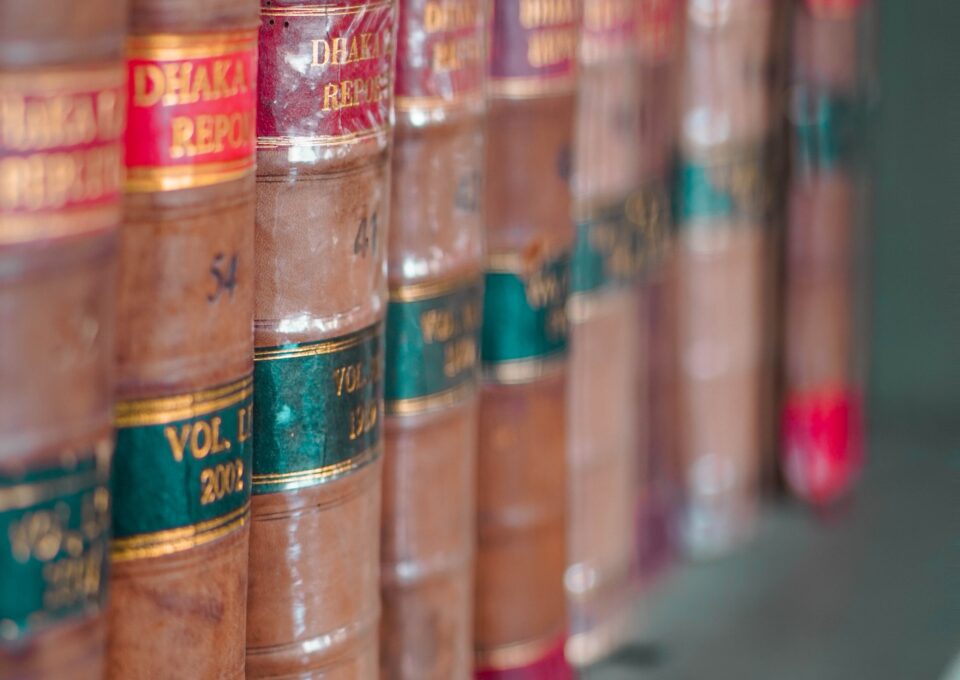10 Best Books For Law Students
Legal books have something of a reputation for being long, impenetrable reads that demand hours of pouring over minute details of incredibly specific areas of law. However, whilst there may be some ancient tomes for which this is true, there are still plenty of very readable books about Law as a subject, as a philosophy, and as a practice.
People have been writing about law for as long as history has been recorded. The oldest known legal text is a Babylonian carving known as Hammurabi’s Code, which dates back almost two thousand years BC. Ever since then, writers from across the globe have continued to put pen to paper and try to find new ways of understanding legality, ethics, and justice.
With so many thousands of texts to choose from, where should a budding law student begin their journey through the world of legal literature?
We are going to take a look at ten classic texts that every law student should read to give them a solid grounding in the subject, as well as a clear understanding of the history of thinking and practice in the legal world.
What are the 10 best books for law students?
From Plato and Machiavelli to Charles Dickens and Harper Lee, our top ten list of books for Law students covers a range of forms, epochs, and literary styles. The list is compiled of books that serve as entry-level academic guides, literary masterpieces, and classical philosophical treatises, all of which Law students should familiarise themselves with as each offers a foundation in the subject in their own unique way.
Any top ten list will of course miss out some key texts that many people will think should have been included. Our list is not definitive, and each text will hopefully inspire any budding lawyers to continue to explore the wealth of legal literature that is out there. All of these books should be available from any good library.
So let’s jump in and take a look at the 10 best books for law students.
Letters to a Law Student, by Nicholas McBride
Letters to a Law Student is a quintessential text for any budding Law school student. Written by Pembroke College Cambridge Fellow Nicholas McBride, the book is formatted as a series of letters that are accessible and engaging and are aimed at teenagers and young adults preparing for a Bachelor’s of Law (LLB) or for the Graduate Diploma in Law (GDL).
The book serves as a guide to studying Law at university, what the courses cover, what the legal profession is like, where to study, and whether or not studying Law as an academic subject is right for you. McBride also flags up many of the challenges that Law students face, gives tips and hints on succeeding in exams, and suggests career alternatives for graduates with a Law degree.
Of all the Law books you will encounter on your journey as an undergraduate, Letters to a Law Student is one of the most important texts that should be read and reread throughout your studies.
About Law: An Introduction, by Tony Honoré
Tony Honoré recently passed away and made many contributions to the legal and academic professions through his long and esteemed career. Over the course of his life, Honoré published 13 books. Of the 13, About Law is perhaps the most well known and the book is widely regarded as one of the best introductions to the subject.
About Law is suitable for both prospective Law students and for any laypeople who are curious to know more about law and its history. It explores the Western tradition of law as a whole and is not just confined to the English legal system. Honoré outlines many of the key problems and practices of the various fields of law; criminal, constitutional, property, etc.
The book is well known for being easy to read and accessible for anyone who is new to law.
Bleak House, by Charles Dickens
Our first fiction entry is Bleak House by Charles Dickens. Before his success as a novelist, Dickens was a court reporter and drew on many of his experiences for his later writing work.
Bleak House has a large number of characters and subplots, but at the centre of the narrative is the interminable Jarndyce versus Jarndyce legal case that concerns a dispute over a will. Although the work is entirely fictional, Dickens claimed that the legal case that runs through the book was based on multiple historical precedents. Scholars often point to the true story of the Thellusson versus Woodford case in which a will was read and contested in 1797 and, after a lengthy, bitter, and costly dispute, was finally resolved in 1859.
The book is widely regarded as a masterpiece of fiction and legal literature and it was even used to help support the judicial reform movement in the mid-19th century.
The Republic, by Plato
The best-known work of the best-known thinker in Western philosophical history. Written around 375 BC, The Republic was first published in ancient Greece, at the dawn of the justice system, when great minds were contending with the big questions of how to live as a society, what fairness really means, and who decides the laws.

As with much of his work, Plato wrote the book as a Socratic dialogue in which Socrates talks with Athenians and foreigners alike about the meaning of justice and the rule of law. The Republic attempts to unpack justice on both an individual and societal level and tries to locate where and how the two can balance one another out in both the civic and personal domains.
The Republic is a key text for students of many disciplines and for lawyers it serves as an exploration of the fundamental principles of living in a society that has a collective sense of justice.
To Kill a Mockingbird, by Harper Lee
The second fiction entry on our list is Harper Lee’s To Kill a Mockingbird. The 1960 novel is one of the great American texts of the 20th century and is read and adored by children and adults alike the world over.
To Kill a Mockingbird explores the racial tensions in the fictional Alabama town of Maycomb through the trial of a black man accused of assaulting a white woman. The story is told through the eyes of a six-year-old girl called Scout whose father, Atticus Finch, is the lawyer of the accused. The novel shows the process of learning we all go through – consciously or otherwise – as our society imbues us with ideas of justice, equality, community, and the importance of law.
Atticus Finch has since become one of the most iconic characters in literary history and stands as a heroic symbol for morality and fairness. While the book is purely fictional, prospective lawyers can learn a lot about the importance of law and the moral virtue that comes with defending anyone who has been unjustly forsaken by their own community.
On Liberty, by John Stewart Mill
John Stewart Mill was an English philosopher of the 19th century. Published in 1859, On Liberty is one of his most highly regarded works. It concerns ideas of freedom and how the liberty of the individual can best be supported whilst maintaining the rule imposed by the authority of society.
Liberty is a crucial concept for any student of law to analyse. Like justice, the idea of what it means to be free is hard to define and absolute freedom is limited somewhat by the law. Mills’ extended essay advocates the importance of individuality and the ideals of utilitarianism.
On Liberty is an important text for anyone looking to understand the foundations of modern thought with regards to the individual in a society governed by laws.
Is Eating People Wrong? Great Legal Cases and How They Shaped the World, by Allan Hutchinson
We can often think of the law as something that is set and unchangeable, forgetting that it is an abstract concept that has been entirely created by other human minds. Allan Hutchinson’s book, Is Eating People Wrong? explores a number of peculiar cases that highlighted holes in the law and subsequently led to the creation of new laws.
The titular case refers to the tragic story of the crew aboard The Mignonette who were left marooned after a storm. The four men were starved and dehydrated and when one of them fell into a coma, the others conspired to kill and eat him. When they were eventually found all three were candid about what had happened, as they thought they would be protected by the laws of the sea. But eventually, the case went to court and the men were found guilty of murder, even though they would have died themselves had they not eaten their shipmate.
This is just one of the weird and unsettling cases that Hutchinson guides the reader through. The book explores how laws come to be and the very human decisions that are made in the process of determining them.
The Prince, by Niccolo Machiavelli
Niccolo Machiavelli was a prominent political thinker and diplomat of the Florentine Republic in the late-15th/early-16th century. His name has since become a byword for unscrupulous deception, manipulation, and subterfuge, largely due to the ideas he espoused in his most famous treatise, The Prince.
The Prince is a short and accessible read and concerns the role and duties of leaders and how they should govern. Although not necessarily a legal text, The Prince has influenced rule makers and leaders for centuries and is regarded as a classic in the philosophical canon.
With many politicians over the years being influenced by The Prince, Law students can learn a lot about public law and the civic duty of the powerful by reading this masterpiece.
Learning the Law, by Glanville Williams
Another introductory text, Glanville Williams’ Learning the Law is similar to Honoré’s About Law, which we saw earlier. Williams’ book gives a meatier introduction to the English system.
Williams died in the 90s and was known in his life as a reformer due to his liberal support for legalising euthanasia and abortion, and his role in decriminalising suicide in the 1960s. Learning the Law is a great introductory text for anyone who wants to learn about the legal profession and history from a true doyenne of the world.
Landmarks in the Law, by Lord Denning
Lord Denning was a British judge who, in his 100-year life, became known as one of the most influential judges in the history of law. He made it his focus to make law more accessible to laypeople and he subsequently became known as the ‘people’s judge’.
Landmarks in the Law takes the reader through some of the most seismic cases in English legal history. The book is divided into sections called; High Treason, Freedom of the Press, and Murder. In each section, Denning analyses some of the most high profile cases and explains the changes they brought to law.
Denning’s book is a crucial text for all students of Law, written by a man who knew it better than almost anyone else.

